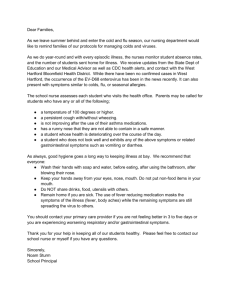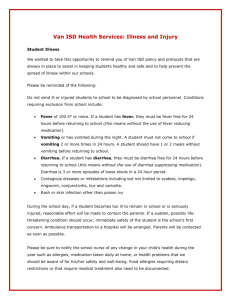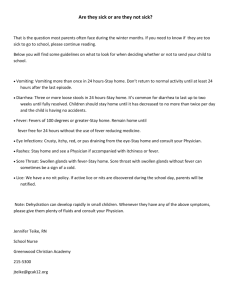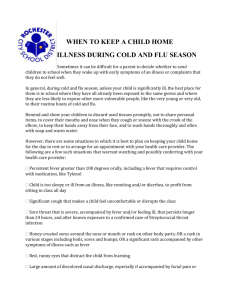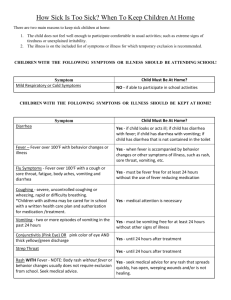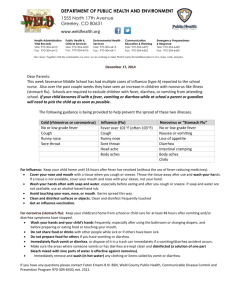Regarding Flu and GI
advertisement
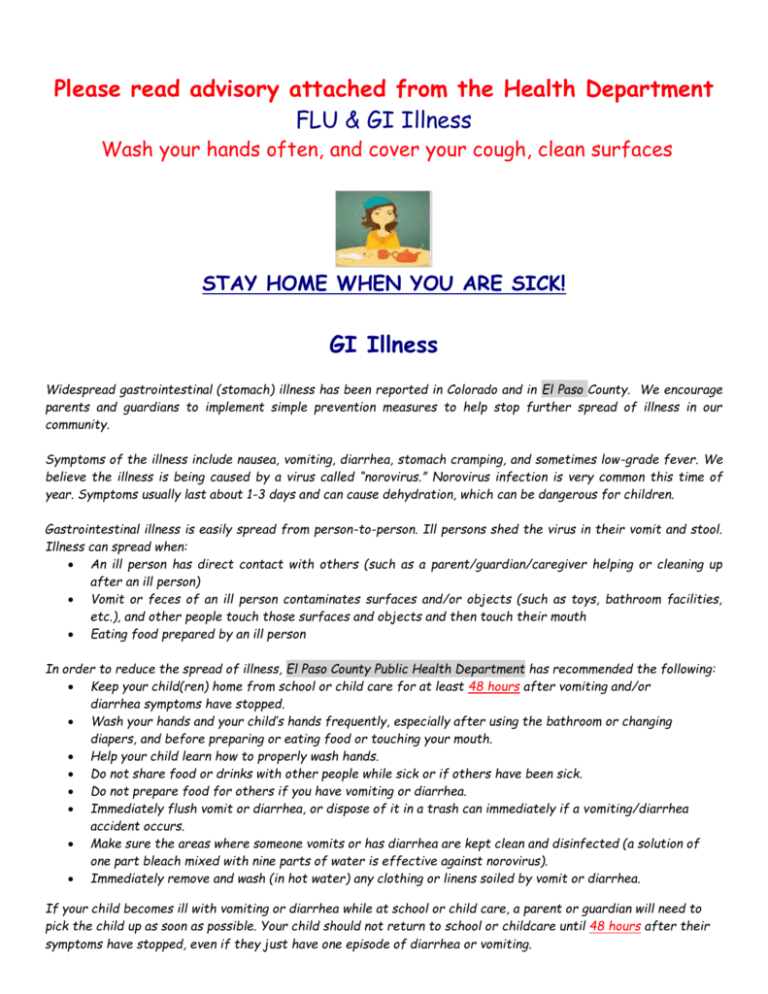
Please read advisory attached from the Health Department FLU & GI Illness Wash your hands often, and cover your cough, clean surfaces STAY HOME WHEN YOU ARE SICK! GI Illness Widespread gastrointestinal (stomach) illness has been reported in Colorado and in El Paso County. We encourage parents and guardians to implement simple prevention measures to help stop further spread of illness in our community. Symptoms of the illness include nausea, vomiting, diarrhea, stomach cramping, and sometimes low-grade fever. We believe the illness is being caused by a virus called “norovirus.” Norovirus infection is very common this time of year. Symptoms usually last about 1-3 days and can cause dehydration, which can be dangerous for children. Gastrointestinal illness is easily spread from person-to-person. Ill persons shed the virus in their vomit and stool. Illness can spread when: An ill person has direct contact with others (such as a parent/guardian/caregiver helping or cleaning up after an ill person) Vomit or feces of an ill person contaminates surfaces and/or objects (such as toys, bathroom facilities, etc.), and other people touch those surfaces and objects and then touch their mouth Eating food prepared by an ill person In order to reduce the spread of illness, El Paso County Public Health Department has recommended the following: Keep your child(ren) home from school or child care for at least 48 hours after vomiting and/or diarrhea symptoms have stopped. Wash your hands and your child’s hands frequently, especially after using the bathroom or changing diapers, and before preparing or eating food or touching your mouth. Help your child learn how to properly wash hands. Do not share food or drinks with other people while sick or if others have been sick. Do not prepare food for others if you have vomiting or diarrhea. Immediately flush vomit or diarrhea, or dispose of it in a trash can immediately if a vomiting/diarrhea accident occurs. Make sure the areas where someone vomits or has diarrhea are kept clean and disinfected (a solution of one part bleach mixed with nine parts of water is effective against norovirus). Immediately remove and wash (in hot water) any clothing or linens soiled by vomit or diarrhea. If your child becomes ill with vomiting or diarrhea while at school or child care, a parent or guardian will need to pick the child up as soon as possible. Your child should not return to school or childcare until 48 hours after their symptoms have stopped, even if they just have one episode of diarrhea or vomiting. Flu Illness Symptoms and Emergency Warning Signs The symptoms of flu can include: Fever (although not everyone with flu has a fever) Cough Sore throat Runny or stuffy nose Body aches Headache Chills Tiredness Sometimes diarrhea and vomiting *It's important to note that not everyone with flu will have a fever. What should I do if I get sick? Most people with the flu have mild illness and do not need medical care or antiviral drugs. If you get sick with flu symptoms, in most cases, you should stay home and avoid contact with other people except to get medical care. If, however, you have symptoms of flu and are in a high risk group, or are very sick or worried about your illness, contact your health care provider (doctor, physician’s assistant, etc.).Do I need to go the emergency room if I am only a little sick? No. The emergency room should be used for people who are very sick. You should not go to the emergency room if you are only mildly ill. If you have the emergency warning signs of flu sickness, you should go to the emergency room. If you get sick with flu symptoms and are at high risk of flu complications or you are concerned about your illness, call your health care provider for advice. If you go to the emergency room and you are not sick with the flu, you may catch it from people who do have it. What are the emergency warning signs of flu sickness? In children Fast breathing or trouble breathing Bluish skin color Not drinking enough fluids Not waking up or not interacting Being so irritable that the child does not want to be held Flu-like symptoms improve but then return with fever and worse cough Fever with a rash In addition to the signs above, get medical help right away for any infant who has any of these signs: Being unable to eat Has trouble breathing Has no tears when crying Significantly fewer wet diapers than normal In adults Difficulty breathing or shortness of breath Pain or pressure in the chest or abdomen Sudden dizziness Confusion Severe or persistent vomiting Flu-like symptoms that improve but then return with fever and worse cough Are there medicines to treat the flu? Yes. There are drugs your doctor may prescribe for treating the flu called “antivirals.” These drugs can make you better faster and may also prevent serious complications. How long should I stay home if I’m sick? CDC recommends that you stay home for at least 24 hours after your fever is gone except to get medical care or other necessities. Your fever should be gone without the use of a fever-reducing medicine, such as Tylenol®. You should stay home from work, school, travel, shopping, social events, and public gatherings. What should I do while I’m sick? Stay away from others as much as possible to keep from infecting them. If you must leave home, for example to get medical care, wear a facemask if you have one, or cover coughs and sneezes with a tissue. Wash your hands often to keep from spreading flu to others. Stay at home and rest. 1. Avoid close contact with well people in your house so you won’t make them sick. 2. Drink plenty of water and other clear liquids to prevent fluid loss (dehydration). 3. Treat fever and cough with medicines you can buy at the store. Please let your child’s school know if you suspect your child has the flu or Norovirus. Thank you, J. Michelle Gold, BSN,RN jgold@d49.org
